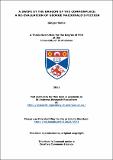Files in this item
A swipe at the dragon of the commonplace : a re-evaluation of George MacDonald's fiction
Item metadata
| dc.contributor.advisor | MacLachlan, Christopher | |
| dc.contributor.author | Stelle, Ginger | |
| dc.coverage.spatial | 289 | en_US |
| dc.date.accessioned | 2011-08-12T15:08:34Z | |
| dc.date.available | 2011-08-12T15:08:34Z | |
| dc.date.issued | 2011-11-30 | |
| dc.identifier | uk.bl.ethos.552607 | |
| dc.identifier.uri | https://hdl.handle.net/10023/1974 | |
| dc.description.abstract | This thesis offers a re-evaluation of the fiction of George MacDonald (1824-1905), both fantasy and non-fantasy. The general trend in MacDonald studies is to focus primarily on his works of fantasy, either ignoring the rest (which includes non-fantasy fiction, sermons, poetry, and criticism) or using them to illuminate the fantasies. The overall critical consensus is that these works, particularly MacDonald’s non-fantasy fiction, possess little inherent value. Though many critics acknowledge similarities between MacDonald’s fantasy fiction and his non-fantasy fiction, MacDonald has been the victim of a critical double standard that treats fantasy and realism as completely irreconcilable, and allows certain features to be acceptable, even desirable, in one form that are completely unacceptable in the other. The thesis begins by looking at MacDonald’s writings about the imagination and about literature, from which a clear theory of literature emerges, one with strong opinions about the function and purpose of literature, as well as about what makes good literature. By re-examining MacDonald’s fiction, its plots, characterization and narration, in the light of his own theories, the reasons underlying the artistic choices made throughout his fiction take on a more deliberate and calculated appearance. Furthermore, by placing MacDonald in his proper context, and looking at the diversity of generic options available to the Victorian writer, the critical double standard underlying much MacDonald scholarship, based on a strict fantasy/realism separation, crumbles. What emerges from this analysis is a different MacDonald—a careful craftsman who consciously and skillfully uses the tools of his trade to produce a unique and specific reading experience. | en_US |
| dc.language.iso | en | en_US |
| dc.publisher | University of St Andrews | |
| dc.rights | Creative Commons Attribution-NonCommercial-NoDerivs 3.0 Unported | |
| dc.rights.uri | http://creativecommons.org/licenses/by-nc-nd/3.0/ | |
| dc.subject | MacDonald, George | en_US |
| dc.subject.lcc | PR4969.S8 | |
| dc.subject.lcsh | MacDonald, George, 1824-1905--Criticism and interpretation | en_US |
| dc.subject.lcsh | English fiction--19th century--History and criticism | en_US |
| dc.title | A swipe at the dragon of the commonplace : a re-evaluation of George MacDonald's fiction | en_US |
| dc.type | Thesis | en_US |
| dc.type.qualificationlevel | Doctoral | en_US |
| dc.type.qualificationname | PhD Doctor of Philosophy | en_US |
| dc.publisher.institution | The University of St Andrews | en_US |
This item appears in the following Collection(s)
Except where otherwise noted within the work, this item's licence for re-use is described as Creative Commons Attribution-NonCommercial-NoDerivs 3.0 Unported
Items in the St Andrews Research Repository are protected by copyright, with all rights reserved, unless otherwise indicated.


